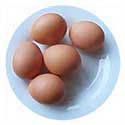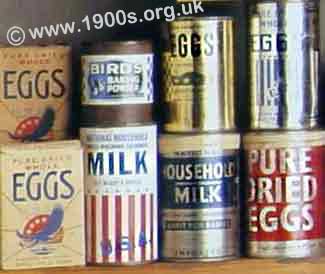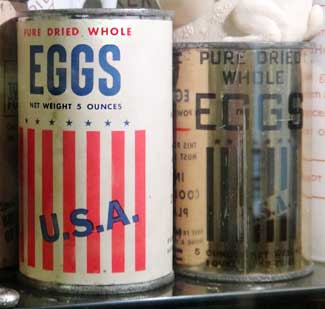Eggs as a food basic in 1940s wartime Britain

Eggs were the basis for many nourishing meals in Britain during the rationing and austerity of World War Two. The page explains how and goes on to describe the egg ration and ways round it by keeping hens and using dried eggs from America.
____
By the webmaster based on discussions with older people and research in museums
The wide range of meals based on eggs
There was a lot that housewives could do with eggs. They could be boiled, fried, scrambled and used in baking. All produced nourishing and enjoyable meals.
Obtaining fresh eggs
Most families with enough ground kept hens. Country people were more fortunate than townspeople in this respect, but even townspeople kept hens in the tiniest possible plots. Householders who kept hens, tended to have spare eggs which they could barter with those who had not.
We never kept hens because my mother had a horror of them.
I clearly remember my weekly egg ration, which was served as a boiled egg with 'soldiers'. 'Soldiers' was the name given to strips of bread and butter used to dip into the yolk of a boiled egg. At that time, though, the 'butter' would have been thinly spread margarine. I was too young to know the difference.
Dried eggs
There was also dried egg powder which came from America and could be used in baking or for scrambled egg. The dried eggs came from the grocer we were registered with - in our case, Sainsbury's.


Tins and packets of dried eggs from the USA. Photographed in Eastbourne Museum of Shops.
Dried egg ration
contributed by Peter Johnson, recollections
At one time, the adult's ration of dried egg was equivalent to three eggs per week. Children were allowed twice as many.
What dried eggs looked like and how they were used
contributed by Peter Johnson
Dried eggs looked like custard powder. They came from America in small thick cardboard boxes printed with the American flag and covered in a waterproof wax coating for freshness. You put some in a bowl and added water or milk and a pinch of salt, whisked it up and poured it into a frying pan. The result looked like a pancake. To me it tasted wonderful.
| sources | webmaster | contact |
Text and images are copyright
If you can add anything to this page or provide a photo, please contact me.



